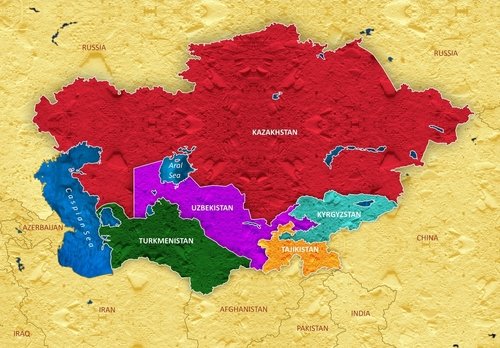Central Asia is certainly not among the regions frequently mentioned in European media. However, it deserves much greater attention, especially since its political and economic relevance gradually increases.
Belgium (Brussels Morning Newspaper), The historical significance of Central Asia as a crucial region is not a recent discovery. Its geographical location has predisposed it to this role for centuries. In ancient times, the Silk Road passed through this region, connecting China with the Mediterranean and, consequently, the entire civilized part of Europe.
Central Asia was, therefore, the vital link between the Far East and Europe until the era of overseas voyages. In the 19th century, the region became a part of the so-called Great Game, in which two significant world powers of that time – Great Britain and Russia – competed for influence. It is interesting to observe how this region has played a vital role in shaping the course of world history.
Following the dissolution of the USSR, the Kremlin held a firm grip on the Central Asian region, consisting of Kazakhstan, Kyrgyzstan, Tajikistan, Turkmenistan, and Uzbekistan. However, this began to change in the 21st century. The region’s strategic importance has started to grow again, and Russian influence is no longer taken for granted.
Russian influence is no longer the only factor at play, as China has also started to compete in the region. Central Asia presents a significant opportunity for the EU. Despite the challenging situation, Europe has already been able to capitalize on some of them.
Mutual Benefit
A significant shift has been achieved, particularly in relations with Kazakhstan, the largest country in Central Asia in terms of area, covering 2.7 million square kilometres and making it the largest landlocked state in the world. Despite its vast size, it is home to only 20 million people. Besides its crucial geographical location, Kazakhstan has a rapidly growing economy, offering numerous investment opportunities and holding rich deposits of critical raw materials.
European efforts towards closer cooperation have been welcomed in Kazakhstan. During the 38th session of the Berlin Eurasian Club (BEC) held in mid-October in Brussels, Roman Vassilenko, the Deputy Minister of Foreign Affairs of Kazakhstan, praised the willingness to intensify cooperation between Kazakhstan and the European Union (EU).
The representative of the Central Asian country also highlighted the current positive developments in trade, economy, and investment cooperation. This was evident in the approximately 39% increase in trade turnover between Kazakhstan and the EU to over $40 billion last year, along with EU investments totalling $12.5 billion.
He continued by assuring the EU business community that in implementing their projects, they can count on full political support, especially in green energy, rare earth metals, and transportation and logistics connections.
For Europe, these words signify positive news in its efforts to reduce dependence on Russian raw materials. Cooperation with Kazakhstan holds strategic significance for the EU as Kazakhstan is the world’s largest supplier of uranium. It also possesses significant oil and natural gas reserves and, among other things, has offered Europe oil deliveries to cover shortfalls in Russian imports.
Declining Russian Influence
Deepening relations will benefit both sides, and Kazakhstan will undoubtedly reap the rewards. Strengthening ties with Europe signifies a shift away from the influence of both giants – Russia and China. While the largest Central Asian country is a member of the Moscow-led Collective Security Treaty Organization military alliance, and as mentioned, it is also subject to the influence of another neighbouring power – China, it has been striving to pursue a more independent foreign policy, especially since the beginning of the Russian invasion of Ukraine. Europe can be crucial in helping Central Asian countries act as independent actors.
However, it is not the time to rest on laurels. There are still risks to consider. Russian influence has not entirely disappeared, and Central Asia is also a region through which sanctioned goods reach Russia. Nevertheless, the region offers opportunities in various aspects, especially in providing Europe with much-needed diversification of strategic raw material supplies and developing essential partnerships.
This is particularly significant today, as Europe must seek allies everywhere, given its diminishing influence in third countries. The ongoing success in deepening relations with Kazakhstan demonstrates that the effort to develop relationships with Central Asia at the European level is meaningful.
A similar approach must be taken in all countries in this region, as recently emphasized by the European Parliament’s Committee on Foreign Affairs. The declining Russian influence in this area presents a unique and irreplaceable opportunity for Europe.




